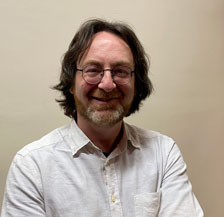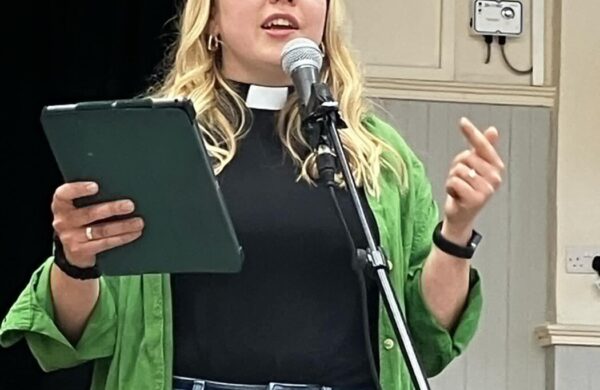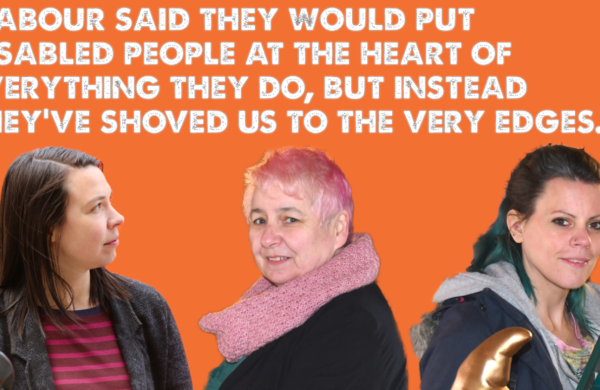1 city, 8 tales: sudden poverty & an outpouring of goodwill
Our latest podcast episode features some inspiring stories of kindness and solidarity from York. Press play below to listen.
All of us, all over the country, have hopefully seen very clearly the kindness and compassion that have flown through society in recent months.
Neighbours looking out for one another, communities pulling together, people sharing supplies or simple words of kindness and encouragement. In adversity, we have pulled together.
In this blog and in the accompanying podcast, we take a snapshot look at just one city: York. There, community groups and residents tell of inspiring teamwork and solidarity. In the words of one person we spoke to, “there has been a fantastic outpouring of goodwill”. Hopefully, much of this rings true wherever you are as well.
You can listen to some of the people we spoke to on our podcast. If you prefer the written version, read on.
The city’s elected leaders have already been looking at how to harness the kindness and goodwill for the long-term. The council’s own registered volunteers had provided more than 25,000 hours of support by the end of May, dealing with thousands of requests for help. Other projects and informal support networks take that number far higher.
Here are contributions from some of the many people and projects pulling together around the city.
Mary Passeri & Sydnie Corley, York Food Justice Alliance
“We’ve had people come from all over, even from areas that people consider affluent, looking for food. There’s a lot of hidden poverty out there in York.
“We’ve had quite a few emails saying people are struggling, who don’t know the routes of how to get help or they have tried certain routes and not had any feedback or response because everyone is inundated with trying to help people they originally supported, or people who are in isolation.
“The best thing we’ve been able to do is to link up with other little informal groups. This is the beauty of the alliance; it’s made up of lots of different people in different areas of York. So if we get a load of bananas, we’ve been able to swap bananas for rice, for example. We share food out. It’s been amazing how supportive and how quickly people can get help and support.
“It’s put a mirror up to people that, you know what, this could be you. It could be anybody.
“We’re going to be supporting families for a very long time. Hopefully we can get our food market back up and running because we are supporting so many people that didn’t necessarily want to admit they needed extra food, and they may be people who are on the side now and not actually getting support. There’s still that stigma or shame unfortunately, which hopefully is breaking down now.
“It’s amazing how people have come together; people we thought would never support or even understand that food security was a problem have just come round and are offering to help all the time.”
Tony Carson, who lives in the city-centre
“We’re on Universal Credit. I think everybody knows it’s a very flawed system. We just about manage to get by. You certainly don’t live an extravagant lifestyle but we budget as well as we can; we limit ourselves to £2 per person per day food-wise so we can afford to keep up to date with the bills. That’s effectively how you have to exist.”
Tony and his partner Sue were homeless for seven weeks in 2018, but have been in a flat for the past 18 months, and Tony has been working as a cycle courier and advertiser. That work has dried up, so he is looking forward to finding work again, and to seeing Sue’s daughter’s new baby for the first time.
He hopes also that the drive to ensure nobody was sleeping rough during the lockdown can be a turning point:
“I’m not a great fan of our present Government but on this occasion I think they did a very good job and in actively seeking out the homeless and getting them indoors. There’s an argument to say it should have been done years ago… It’s always been something people have turned a blind eye to. There are still people choosing to be outdoors; that’s their decision, but the greater majority of people who were homeless in the city are now in the Staycity [an aparthotel in the city centre]. It’s got to be a better solution, it’s obviously not a long-term solution, but let’s hope in the long run that lessons are learned by this.”
Nicky Gladstone runs Carecent, which provides hot breakfasts, showers, support and kindness to people who are homeless or otherwise in need
When lockdown began, Carecent switched to a delivery service, making packed lunches for their regulars who were temporarily in hotels and B&Bs, and liaising with other local organisations to ensure further support.
“At the highest point, we were making 50 packed lunches a day and then other amazing groups were providing food in the evenings… Our main volunteer group is largely made up of people from the slightly older section of society, so we appealed on social media and we were overwhelmed by the kindness of people who came forward and offered their help, people who had been furloughed, students who had come back, people who were out of work.
“In fact things changed so quickly that although we had this fantastic second body of volunteers, we were not able to use them and we have a tiny skeleton team of eight now, in teams of two, that make the sandwiches. We have kept it as small as possible to reduce any risk of infection. But we are hoping maybe to make use of some of that fantastic outpouring of goodwill as we look towards reopening.
“I do feel a real sense of positivity. We have all, across York, enjoyed such close collaboration, real partnership working with us, our friends at KEY and other food providers, Salvation Army, the Peaseholme, the council, Changing Lives; we’ve all worked together so closely and shared information where appropriate and looked after each other. I really believe that this is a new opportunity to work together, to work closely, to all pull in the same direction and really make some long-term differences.”
Nicky says co-production with people who are currently homeless is easy to overlook, while projects are rolling their sleeves up, but she says: “It is so important to work in co-creation and co-production with people who genuinely have lived experience and to find out what it is they want and need. So often it is easy to decide we know the answers, but we know there is no substitute for asking those questions and involving people who really know what they are talking about.
“We saw so clearly what was valuable in this lockdown; we’ve seen so clearly the things that matter, the people who really make a difference and it would be wonderful to think that we could hold on to that, that we could carry on celebrating the people who actually keep up going and keep the wheels of society turning – and it’s perhaps not who everybody thought it was to start with. We have looked after each other, haven’t we, and it would be wonderful to think that that could carry on.”
Rosie Wall, Chapelfields resident
Rosie has helped run the Chapelfields Community Association for many years. She has been shielding during the outbreak but her daughters and grandson have been running a pop-up food stall and delivering food to 71 homes locally.
“We are doing deliveries to a list of homes. We get food from various projects – Kitchen For Everyone York, Morrisons, Lidl, M&S and others. We give out what we can. Some weeks we can’t meet all the requests but we go as far as we can. A lot of people here, especially the elderly, are on their own and cannot get out, but we put food on the doorstep and they take it in.
“People have been really kind and some people have given donations so we can buy stuff to hand back out, and we have a facebook page so we can say if we need anything.
“I really hope the community stays like this. There’s a lot of kindness and it’s lovely when someone rings and chats. I don’t know when we’ll be able to open our regular hub again but we are keeping in touch with people. Sometimes if you speak to someone who is on their own, you might be their only conversation that day. So it’s not just about the food, it’s a friendly knock on the door and knowing there’s someone there to just chat to from a distance.
“My 13-year-old grandson, Leidan, has been helping a lot. He is autistic and this is keeping him busy, when his routine is out of synch.”
Hilary Platt, Bell Farm Community Hall
“Right from the start we have been providing food. We decided to release our funds from our charity to buy food because we knew it could be needed.
“A lot of people round here were stuck inside and did not have money or could not get out, but were not officially shielded, so were not getting deliveries. We have been helping a lot of people. People have been coming saying they have no food and we are providing parcels through the window. We’ve had people coming from all over York, it’s been very challenging. We struggled at first but we are keeping up now. The local Trussell Trust food bank has been very helpful and giving us donations as well.”
Food has been provided through Fareshare, KEY and others, as well as supermarkets, supplanting the tinned and dried items with fresh food.
“The public have been very generous since they’ve been able to go shopping properly again and the community response has been fantastic; if I say we need a volunteer, I have one within five minutes. We’ve always had a good community spirit. Of course some don’t want to know, but most are very supportive.
“We’ve had so many people saying they want to come and help, and we are asking them now to come and help once this is over, when we need to get the hall and the association back to life, and we need to fundraise and recover. We know this is going to last until at least next year and we probably won’t open the hall fully for a long time. The school holidays and Christmas will be tough. The school vouchers decision is good but a lot of people will not benefit. If you are applying now for Universal Credit, it will be five weeks until you get it and you won’t get the vouchers.
“I’ve had five people here recently who have lost their jobs and Universal Credit will not help them until next month at least. We had someone here who was doing fine. She lives on her own and had a good job, self-employed, but now has no money and no food, but she has realised now that food poverty can happen to anyone. We had a taxi driver as well, who had never struggled before but his wife had become ill and now he had no work, and they have a big family. It has completely changed the way they feel about everything. I think this will have a big change on people’s attitudes; it will change how they feel about people who are on benefits.
“York is expensive. We have people paying maybe £1,000 a month in rent, and Universal Credit does not nearly cover that. People who were maybe slamming others before are now realising they’re not able to get this, that or the other. A lot of the poorest already knew where to turn, but there are people who have never had to struggle before and who are finding it really difficult to access anything, and they’re saying “we’ve never had to do this before”. They feel shame and we’re trying to make them feel okay. We’ve been hearing of people at home for almost a week with no food. I was worried people were going to die. A lot of families are covered by other organisations but there are people without children who, if all their income is suddenly stopped, have nothing left. There’s nobody looking out for them; that’s who we have seen a lot of. But the community is pulling together.”
Maya James, Groves Groceries
Maya helps with Groves Groceries, which runs from St Thomas’s Church. The church website notes: “It’s often said that we are all in the same boat when it comes to the coronavirus crisis. But that isn’t really true. While we are all weathering the same storm, we are in a number of different boats.
“Some of our vessels are large, luxurious and relatively safe. Things may be tough for us but we’re unlikely to slip beneath the waves. Other vessels are small and barely seaworthy. They are being battered by the storm, their occupants clinging on for dear life.”
The project is closely supporting local people who might otherwise be unable to stay afloat, including some families from two local primary schools.
Maya recently shared her story with the city-wide volunteering network. She says: “One of the aims of this project was to provide food for families in real need during this time. Equally, we wanted to use this project as a way of staying in touch with people connected to St Thomas’s, who we might otherwise lose touch with as at the moment we don’t meet physically together on a Sunday or in our midweek groups.
“Just over half of the people we deliver to are within our parish. We also deliver five boxes of food each week to two primary schools in the parish. The other people we deliver to live relatively close by, and are either members of our church family or of the church community groups that we normally run, or they have been referred to us by local organisations.
“Over the last eight weeks we have delivered 419 bags of food, 283 separate deliveries and 28 crates of bread (to Door 84 and Tang Hall Primary School).
“We are working with ‘Your Café’ which hasn’t been able to operate during this time and they have long-standing links to the local supermarkets.
“We will run Groves Groceries until July 22nd. After this, Luke’s larder will recommence from July 28 (1pm to 2pm), from St Luke’s church hall on Burton Stone Lane.
“We believe this has been an enormous answer to prayer to us and we are so pleased we have been able to help so many people during this time.”
John McGall, community activist
John has immersed himself in helping anti-poverty groups in York, after an arm operation and then two rounds of heart surgery changed his outlook on life. He co-founded I Am Reusable, which collects and distributes donations to people on very low incomes across Yorkshire, and which also works to tackle plastic pollution and waste.
He has been shielding during the outbreak but has been coordinating city-wide donations, deliveries and distribution from his house and garage.
“As individuals and individual groups, we can do marvellous things, but as a consortium we can do even more – sharing items, looking for bigger items and trying to get one hub together. We all talk to each other every day and if someone needs something, a bed or whatever, we all try to help.”
He praised the Supper Collective, an alliance of some of the city’s best-known restaurants and cafes and 60 volunteers, who have cooked and delivered meals to NHS workers, people who are homeless, or people who are otherwise struggling, every day for three months.
“York has really pulled together and helped the community, it really has. Businesses, supermarkets, community projects have all come together. People who never talked to each other have been talking and there’s been a big rise in the community helping each other.”
John became involved in local community work after an arm operation just over ten years ago. He had been working for the NHS until then but was shocked to see how poor the support was for people unable to work. “People were being treated appallingly, and going from being a professional person to being unable to work was difficult for me, and there was no help there. If I hadn’t been married, and had my wife for support, I would have become homeless, so I started thinking that if I could help one other person every day, that would be good. My experience means I can help people who are looking to access help. Then after my first heart attack, I started wondering what I could do while sitting at home, but now my garage is full of stuff to share around.
“The big picture is still long-term, especially if we get a second wave. A lot of businesses have donated but we don’t how long that will carry on. Unemployment is going to go right up and with York being a big hospitality city, with low pay and with the hotels not yet open, there will be a knock-on effect. I can see more people needing support and we need to keep pulling together for each other. We will carry on and those most involved have become good friends. We know each other and if we do get back to some sort of normality, we will still carry on helping each other out.”




Thank you for these inspiring stories of ordinary people doing extraordinary things. gives me hope,plus inspiring me to keep trying. Sean Finlay